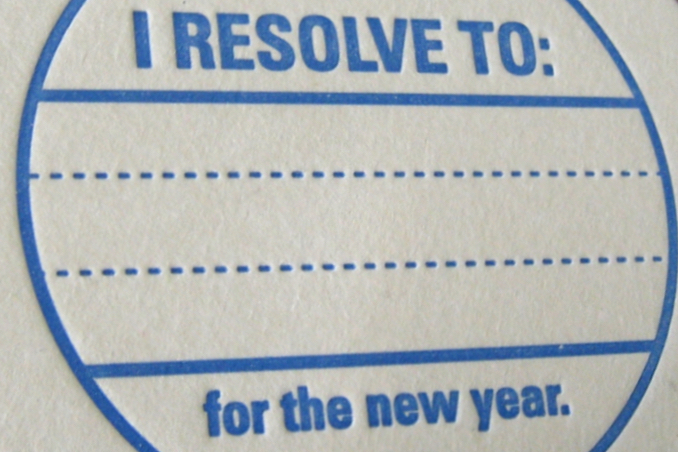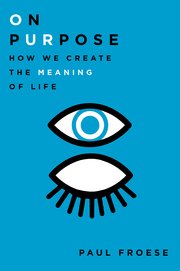I have a theory: New Year’s resolutions have nothing to do with the turn of the calendar year. There’s a much stronger force at play: that, every December, America collectively visits its family.
Every year, millions of families unplug from their day-to-day lives and reunite. Siblings compare their parallel lives. We peruse old photo albums and take mental snapshots of our aging parents, forming a past-and-future flip book of our own aging bodies. We get scared. We tell old stories and overeat.
New Year’s resolutions are what happen when bloated Americans go back to their lives, and then pivot optimistic in the face of death.
On Purpose: How We Create The Meaning of Life
Paul Froese
Oxford University Press
(January 6, 2016)
I participate in this tradition. Every January, I hold my life out in front of me and think about which elements I want to swap out or in. This mode of thinking progresses towards the abstract. Concrete resolutions give way to the big goals: Happiness, Purpose, and Meaningful Relationships. Once a year, Oprah makes sense to me.
This process confused me until I read Paul Froese’s On Purpose: How We Create The Meaning of Life, which is released in hardback by Oxford University Press today. Froese, a sociologist, combines social theory and survey data to explore how people derive meaningfulness from their lives. You might think of On Purpose as a meta-self-help book, and a fascinating one at that.
Paul Froese is Associate Professor of Sociology at Baylor University and Director of the Baylor Religion Surveys. The Cubit recently reached out to him by phone to discuss purpose, religion in modernity, and the brilliance of Tony Robbins.
This interview has been edited for clarity and length.
In your book you argue that modernity has brought about a kind of existential confusion, and you discovered this in an interesting way: by comparing levels of happiness and purposefulness to per-capita GDP. Could you tell us more about that particular study?
I’m interested in thinking about how individuals get moral meaning from the world. Moral meaning comes from social sources, whether it’s friends and family or one’s culture, which gives you languages and symbols to talk about these things.
It’s hard to measure modernity, and so I looked at levels of per capita GDP, which gives us a sense of a country’s level of globalization, technology, and modern medicine, and asked if we can see any difference in terms of how people understand issues of moral meaning and individual purpose. I found that people in post-industrial countries tend to be less likely to say, “I know what my purpose in life is.”
This probably has to do with pluralism. In post-industrial countries you have more religious and philosophical options, and with that comes the possibility that life can be completely meaningless. So then the question is: Who picks that option? Are they free, or forced into it by choice? What I find is that people in the post-industrial world feel a loss of community, and are also living in cultures that don’t have an overarching religious or cultural framework that ascribes meaning to them.
You argue that meaninglessness is unequally distributed within advanced societies. What demographics are more likely to report a lack of purpose?
You would think that it’s the highly educated, or people who are more cosmopolitan, because they’re confused by all the options, but it’s actually the poorer people in post-industrial countries. And if you compare people in poverty in post-industrial countries to people in poverty in the third world, the former are much more likely to say that they lack purpose.
These people probably suffer from an existential relative deprivation. They see a society around them that is full of progress and wealth and technology, and maybe they don’t feel a part of it. They’re also within a culture that doesn’t have a strong, overarching, religious system of meaning, and so they are the ones that are most likely to fall prey to a sense of meaninglessness.
Fox News commentators make a big deal out of the fact that poor people in the post-industrial world have so many things that others don’t—refrigerators, televisions, iPhones—and that’s completely true, but what that misses is that those don’t provide meaning for you. Ironically, those things might communicate to people that the world is moving on without them.
How does religion, as an “overarching system of meaning,” help the disenfranchised?
I think that when somebody has a strong moral system of meaning, it’s easier to cope with setbacks and tragedy. In the developing world you have lots of terrible situations, but in some sense those societies are living like humans have lived for thousands of years, in that they kind of cling to religious culture and symbols, to say, “This is what gives our sense of struggle meaning.”
Religious systems of meaning have always provided that, and they have also tended to be birthed out of places and times where people were undergoing great tragedy. The upside is that religion provides meaning to everything. The downside is it ascribes it to you. If you’re an outlier, there’s no way for you to question what’s going on. A good example of this is that in more traditional cultures that have strong religious systems of meaning, women tend to be in a repressed, more subjugated role, and they don’t really have options to get out.
I want to push back here. There are plenty of religions, especially at cultural borders and intersections, that don’t offer perfectly closed, all-encompassing belief systems. Religions are always changing…
Totally. I think what’s hard about these topics is they’re very broad and infinitely complex, and so I’m reducing things into more simple terms. But I agree with you. In fact one of the things that I struggle with, philosophically, is that we can distinguish between the religious and the secular, but in reality—in lived life—it’s very gray to me where one stops and the other begins. We all have this yearning for moral significance in the world. I think what distinguishes a so-called secular from a religious person is the religious person attempts to frame the moral structure of reality with the concept of the supernatural, whereas the secular person will use either material or social terms to frame their moral reality, and so that’s a difference in terms of language.
Religious systems of meaning can tend to drift towards extreme ideas of absolute truth, but I also think that secular moral systems of belief can do that too. Nationalism, with no reference to the supernatural, can create a very black and white dichotomy of good and evil, and lead to wars.
In your book you argue that we all believe in transcendent ideals, whether they’re articulated in the religious language of God or secular language of justice.
Religious cultures help people create meaning within the world, but religion isn’t the only thing that can do that. You have secular people who live very purpose-driven, meaningful lives.
So up until modernity, many people experienced purpose to their lives thanks to religious systems of meaning, but then with secularism came a loss of any shared sacred ideals. Capitalism makes us more comfortable, but we’ve lost purposefulness in exchange for iPods and Snickers bars. In your book you describe how “therapeutic culture” and the self-help genre have filled this moral vacuum. Could you talk more about that?
With modernity comes this idea that the self is sacred—the individual becomes the ultimate decision maker on what is moral and what is immoral. I think that’s even true within conservative religious traditions within postmodern countries. An example of that is the rise of religious individualism. “How do you know God?” “Well, I don’t know God from what my priest tells me, or by reading a sacred book. I know God from praying and talking directly to God.” God becomes an individual communicator.
I think this fits within this modern sense that, “I decide what’s real and not real.” Now, of course, there’s a paradox here, in that the rise of individualism is constructed by society. We’re never fully individuals—we never really have full power to decide what to think and believe—it’s always a function of the communities and cultures that we’re living within. But I think modernity created the new sacred object of the self.
Exactly! You argue in the book that therapeutic culture privileges self-discovery over any shared, collective sacred, but paradoxically there’s now a shared faith that the self is sacred—that it’s ultimately the place where we’re going to discover fundamental moral truths.
That’s why I had to write a chapter on the self. I’m playing off of Weber, who makes the argument that modernity’s going to disenchant the world. Therapeutic culture is what re-enchants it. I can now discover myself, and my self is as deep and interesting and mysterious as any religious system of meaning.
One of the fascinating things, looking at data, is that in the United States you have so many people saying that they’re trying to find themselves. But at the same time, they are also reporting that they know exactly what their purpose in life is. What that tells me is that you have this belief that self-discovery is a process—it keeps going and going and going, and it never stops. The activity itself is what keeps you active and engaged.
You analyze modern day “purveyors of purpose,” like Tony Robbins, Rick Warren, and Oprah Winfrey. (I would also throw Rob Bell into the mix.) What are some of the common tools that they offer for helping individuals find purpose?
Those very popular people that you mentioned, they either speak to a person or they don’t, and the reason they speak to some people is that those people already share their systems of meaning. And if you don’t share their system of meaning, then they are going to be meaningless to you. You’re already embedded within a community that finds, let’s say Oprah Winfrey or Rick Warren, inspirational—you potentially find them inspirational together.
Where those purveyors of purpose have a very wide reach is that they tend to talk in abstractions that can be applied in any setting. The common method is you’re supposed to look within and your own self will tell you the answers to things. This is, to me, all of Tony Robbins’ message. I think the brilliance of Tony Robbins is he never actually answers any of your questions, he just throws it back to you with his mantra: your self has power, and it will give you the answers, you just have to find them.
Self-discovery, here, is assumed to be inherently good—you’re not expected to look inside and discover evil. Doesn’t this encourage people to ignore the ways that their actions might contribute to larger systems that are sometimes evil? For example, we seem to live in a country where there’s lots of racism, but where nobody thinks of themselves as racist…
I totally agree with you, and that reminds me of Niebuhr’s Moral Man and Immoral Society—that you can believe yourself to be moral within your neighborhood, because people wave to you and you drop off Christmas cookies and you are a good person, but you’re not really seeing the larger picture. If your community, neighborhood, or country is exploiting others, and you feel good about yourself, it’s a kind of false goodness.
I think a very basic human need, which drives the self-help industry, is that people want to feel good about themselves. We’re going to do things to make ourselves feel good about ourselves, and where that can turn evil is when—either by chance or by circumstance—you’re in a group whose purposes are nefarious, and so you derive self-worth and self-esteem out of participating in group projects that are violent or evil.
The classic example is a terrorist cell. I think those people think they’re doing good. They want to feel good about themselves and what they’re doing, and so they attach themselves to an ideology that says, “You are moral, and what you’re doing is good.” I think that is the same mechanism that’s at play for a person who is, let’s say devoting their life to assisting the poor, doing really altruistic wonderful acts.
A feeling of purposefulness isn’t itself sufficient to be sure you’re engaged in something that’s inherently good.
I guess ultimately we all have to be not only very self-reflective, but also reflective of the larger context in which we’re behaving. At some level, the message of my book is a call to readers to ask, “Where am I placed? Where did my moral system come from, and how do I feel about that?”
While researching this book, was there anything that surprised you?
I’m a sociologist, so I see everything as socially constructed: your system of meaning, your purpose, it’s all a function of your friends and culture. It creates a picture of the individual that is almost like a cog in the wheel, where we don’t really have much agency.
But then, on the other hand, we have the faculty of imagination, which we use to come up with our own very unique understanding of the world. There’s so much diversity, so many different ways of looking at things. I think each life purpose is wholly unique. Nobody shares exactly the same perspective or purpose as someone else.






